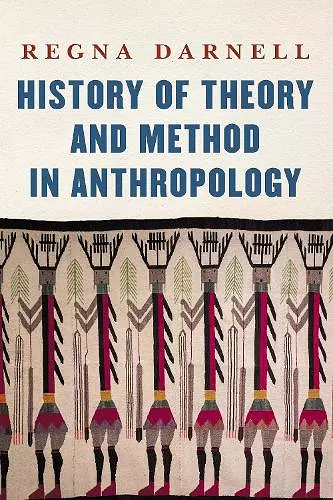History of Theory and Method in Anthropology
Format:Hardback
Publisher:University of Nebraska Press
Published:1st Jun '22
Currently unavailable, and unfortunately no date known when it will be back

Regna Darnell offers a critical reexamination of the theoretical orientation of the Americanist tradition, centered on the work of Franz Boas, and the professionalization of anthropology as an academic discipline in the United States in the late nineteenth and early twentieth centuries. History of Theory and Method in Anthropology reveals the theory schools, institutions, and social networks of scholars and fieldworkers primarily interested in the ethnography of North American Indigenous peoples. Darnell’s fifty-year career entails foundational writings in the four fields of the discipline: cultural anthropology, ethnography, linguistics, and physical anthropology.
Leading researchers, theorists, and fieldwork subjects include Claude Lévi-Strauss, Franz Boas, Benjamin Lee Whorf, John Wesley Powell, Frederica de Laguna, Dell Hymes, George Stocking Jr., and Anthony F. C. Wallace, as well as nineteenth-century Native language classifications, ethnography, ethnohistory, social psychology, structuralism, rationalism, biologism, mentalism, race science, human nature and cultural relativism, ethnocentrism, standpoint-based epistemology, collaborative research, and applied anthropology. History of Theory and Method in Anthropology is an essential volume for scholars and undergraduate and graduate students to enter into the history of the inductive theory schools and methodologies of the Americanist tradition and its legacies.
"The overall achievement of Darnell's authoritative reader is its critical elucidation of the intercultural and interdisciplinary potential of North American anthropology."—Ludwig Deringer, University of Toronto Quarterly
“Assessing and reassessing the field with fifty years of experience and skill allows Darnell to produce sage insights and demonstrate her progressive thinking on critical anthropological themes, such as the effects of social networks on theory.”—N. J. Parezo, Choice
“Regna Darnell invites the reader to listen in on the intimate, collaborative, and frequently contentious conversations that formed the basis for North American anthropology. We are gifted with a clearly written and revelatory unpacking of the connections, alliances, and discordant moments of an anthropology practice grounded in humanistic and scholarly precepts. This timely critical history promises to reintroduce anthropology as a fundamentally humanistic scholarly endeavor whose practitioners continue the long tradition of scholarship in the service of social justice.”—Bernard Perley, author of Defying Maliseet Language Death: Emergent Vitalities of Language, Culture, and Identity in Eastern Canada
ISBN: 9781496224163
Dimensions: unknown
Weight: unknown
348 pages